The End Times - Lesson III
Chris Knepp
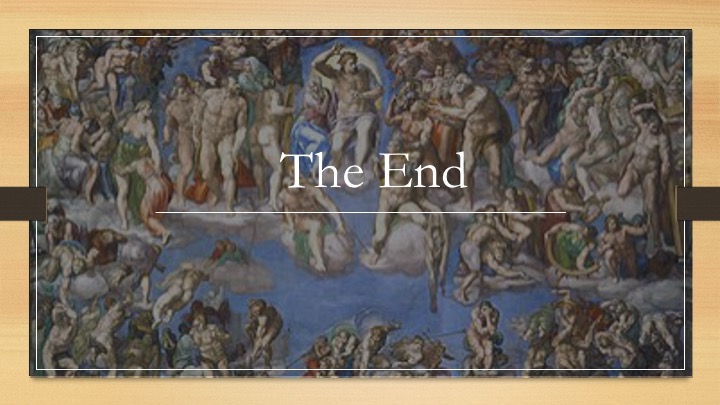
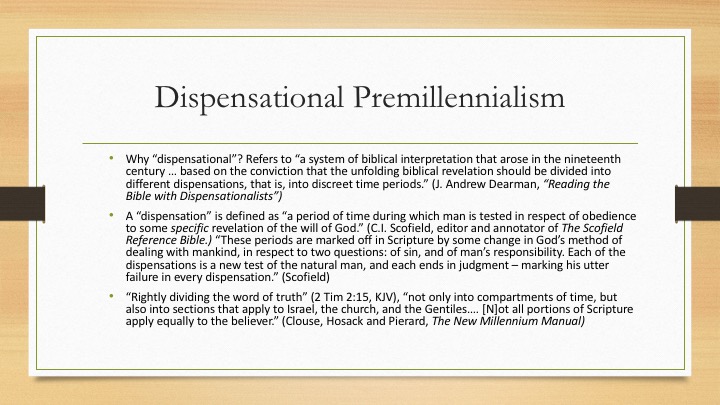
Dispensational Premillennialism
Why “dispensational”? Refers to “a system of biblical interpretation that arose in the nineteenth century … based on the conviction that the unfolding biblical revelation should be divided into different dispensations, that is, into discreet time periods.” (J. Andrew Dearman, “Reading the Bible with Dispensationalists”)
A “dispensation” is defined as “a period of time during which man is tested in respect of obedience to some specific revelation of the will of God.” (C.I. Scofield, editor and annotator of The Scofield Reference Bible.) “These periods are marked off in Scripture by some change in God’s method of dealing with mankind, in respect to two questions: of sin, and of man’s responsibility. Each of the dispensations is a new test of the natural man, and each ends in judgment – marking his utter failure in every dispensation.” (Scofield)
“Rightly dividing the word of truth” (2 Tim 2:15, KJV), “not only into compartments of time, but also into sections that apply to Israel, the church, and the Gentiles…. [N]ot all portions of Scripture apply equally to the believer.” (Clouse, Hosack and Pierard, The New Millennium Manual)
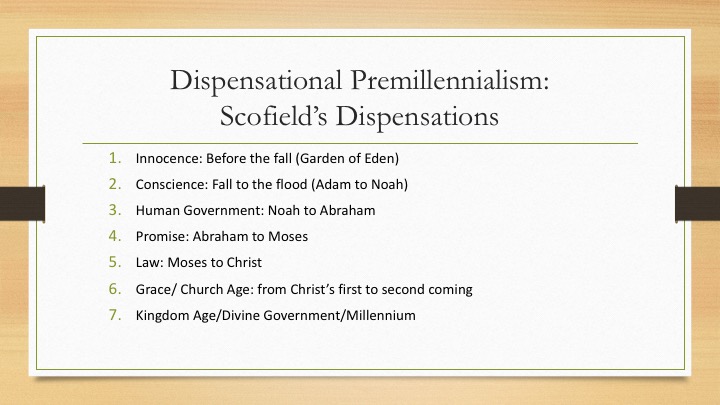
Dispensational Premillennialism:
Scofield’s Dispensations
1.Innocence: Before the fall (Garden of Eden)
2.Conscience: Fall to the flood (Adam to Noah)
3.Human Government: Noah to Abraham
4.Promise: Abraham to Moses
5.Law: Moses to Christ
6.Grace/ Church Age: from Christ’s first to second coming
7.Kingdom Age/Divine Government/Millennium
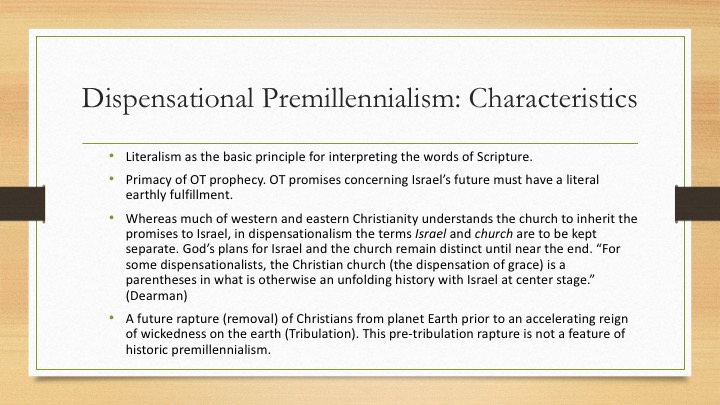
Dispensational Premillennialism: Characteristics
Literalism as the basic principle for interpreting the words of Scripture.
Primacy of OT prophecy. OT promises concerning Israel’s future must have a literal earthly fulfillment.
Whereas much of western and eastern Christianity understands the church to inherit the promises to Israel, in dispensationalism the terms Israel and church are to be kept separate. God’s plans for Israel and the church remain distinct until near the end. “For some dispensationalists, the Christian church (the dispensation of grace) is a parentheses in what is otherwise an unfolding history with Israel at center stage.” (Dearman)
A future rapture (removal) of Christians from planet Earth prior to an accelerating reign of wickedness on the earth (Tribulation). This pre-tribulation rapture is not a feature of historic premillennialism.
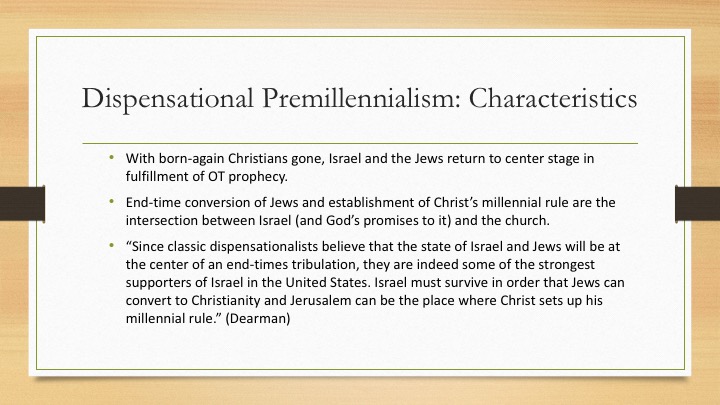
Dispensational Premillennialism: Characteristics
With born-again Christians gone, Israel and the Jews return to center stage in fulfillment of OT prophecy.
End-time conversion of Jews and establishment of Christ’s millennial rule are the intersection between Israel (and God’s promises to it) and the church.
“Since classic dispensationalists believe that the state of Israel and Jews will be at the center of an end-times tribulation, they are indeed some of the strongest supporters of Israel in the United States. Israel must survive in order that Jews can convert to Christianity and Jerusalem can be the place where Christ sets up his millennial rule.” (Dearman)
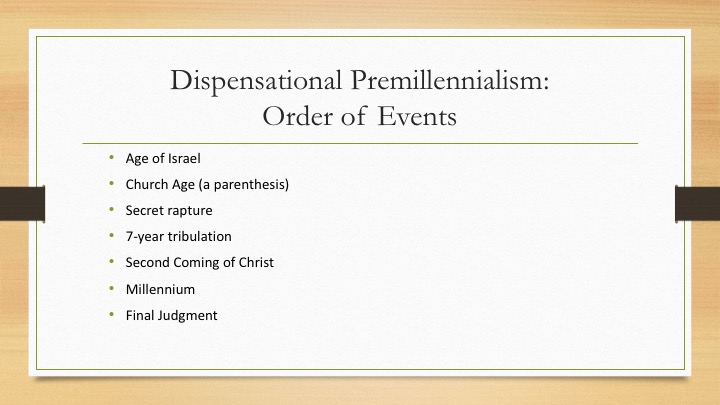
Dispensational Premillennialism:
Order of Events
Age of Israel
Church Age (a parenthesis)
Secret rapture
7-year tribulation
Second Coming of Christ
Millennium
Final Judgment
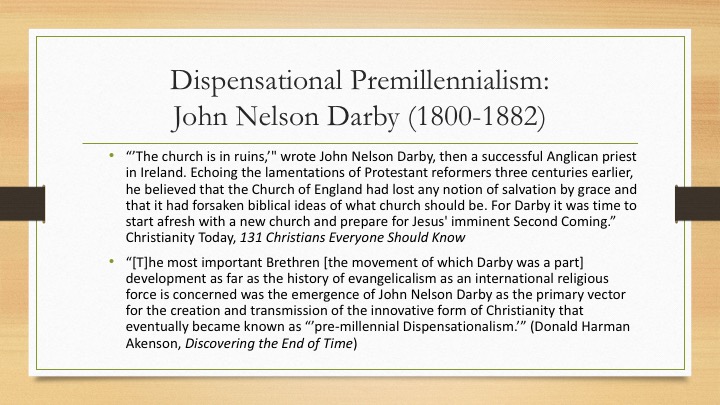
Dispensational Premillennialism:
John Nelson Darby (1800-1882)
“’The church is in ruins,’" wrote John Nelson Darby, then a successful Anglican priest in Ireland. Echoing the lamentations of Protestant reformers three centuries earlier, he believed that the Church of England had lost any notion of salvation by grace and that it had forsaken biblical ideas of what church should be. For Darby it was time to start afresh with a new church and prepare for Jesus' imminent Second Coming.” Christianity Today, 131 Christians Everyone Should Know
“[T]he most important Brethren [the movement of which Darby was a part] development as far as the history of evangelicalism as an international religious force is concerned was the emergence of John Nelson Darby as the primary vector for the creation and transmission of the innovative form of Christianity that eventually became known as “’pre-millennial Dispensationalism.’” (Donald Harman Akenson, Discovering the End of Time)
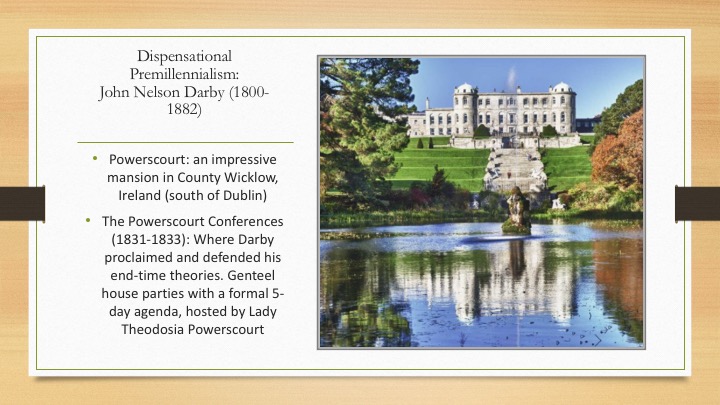
Dispensational Premillennialism:
John Nelson Darby (1800-1882)
Powerscourt: an impressive mansion in County Wicklow, Ireland (south of Dublin)
The Powerscourt Conferences (1831-1833): Where Darby proclaimed and defended his end-time theories. Genteel house parties with a formal 5-day agenda, hosted by Lady Theodosia Powerscourt
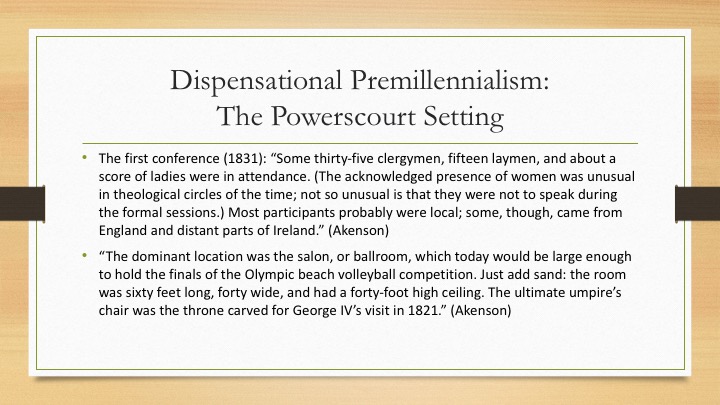
Dispensational Premillennialism:
The Powerscourt Setting
The first conference (1831): “Some thirty-five clergymen, fifteen laymen, and about a score of ladies were in attendance. (The acknowledged presence of women was unusual in theological circles of the time; not so unusual is that they were not to speak during the formal sessions.) Most participants probably were local; some, though, came from England and distant parts of Ireland.” (Akenson)
“The dominant location was the salon, or ballroom, which today would be large enough to hold the finals of the Olympic beach volleyball competition. Just add sand: the room was sixty feet long, forty wide, and had a forty-foot high ceiling. The ultimate umpire’s chair was the throne carved for George IV’s visit in 1821.” (Akenson)
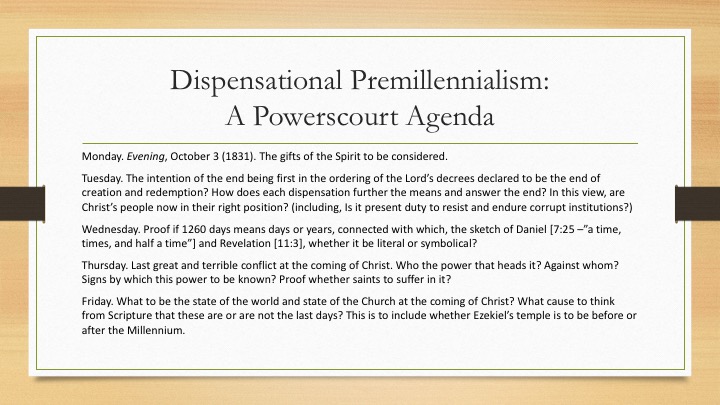
Dispensational Premillennialism:
A Powerscourt Agenda
Monday. Evening, October 3 (1831). The gifts of the Spirit to be considered.
Tuesday. The intention of the end being first in the ordering of the Lord’s decrees declared to be the end of creation and redemption? How does each dispensation further the means and answer the end? In this view, are Christ’s people now in their right position? (including, Is it present duty to resist and endure corrupt institutions?)
Wednesday. Proof if 1260 days means days or years, connected with which, the sketch of Daniel [7:25 –”a time, times, and half a time”] and Revelation [11:3], whether it be literal or symbolical?
Thursday. Last great and terrible conflict at the coming of Christ. Who the power that heads it? Against whom? Signs by which this power to be known? Proof whether saints to suffer in it?
Friday. What to be the state of the world and state of the Church at the coming of Christ? What cause to think from Scripture that these are or are not the last days? This is to include whether Ezekiel’s temple is to be before or after the Millennium.
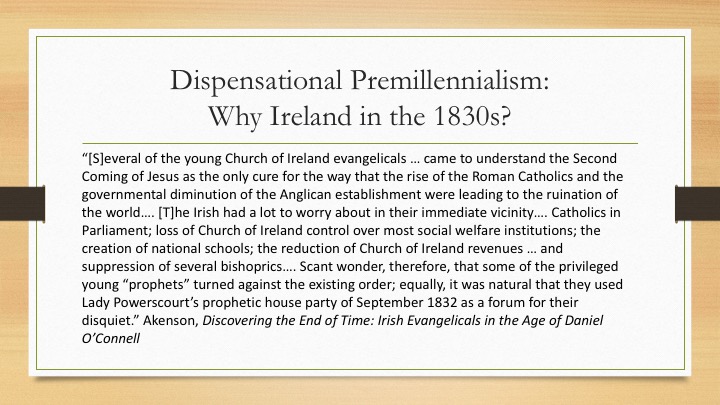
Dispensational Premillennialism: Why Ireland in the 1830s?
“[S]everal of the young Church of Ireland evangelicals … came to understand the Second Coming of Jesus as the only cure for the way that the rise of the Roman Catholics and the governmental diminution of the Anglican establishment were leading to the ruination of the world…. [T]he Irish had a lot to worry about in their immediate vicinity…. Catholics in Parliament; loss of Church of Ireland control over most social welfare institutions; the creation of national schools; the reduction of Church of Ireland revenues … and suppression of several bishoprics…. Scant wonder, therefore, that some of the privileged young “prophets” turned against the existing order; equally, it was natural that they used Lady Powerscourt’s prophetic house party of September 1832 as a forum for their disquiet.” Akenson, Discovering the End of Time: Irish Evangelicals in the Age of Daniel O’Connell
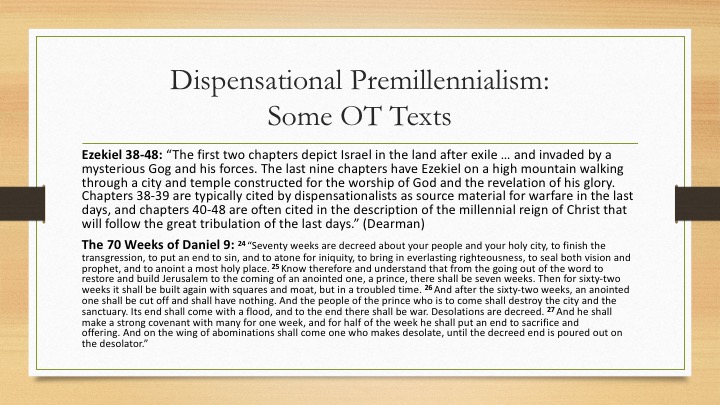
Dispensational
Premillennialism:
Some OT Texts
Ezekiel 38-48: “The first two chapters depict Israel in the land after exile … and invaded by a mysterious Gog and his forces. The last nine chapters have Ezekiel on a high mountain walking through a city and temple constructed for the worship of God and the revelation of his glory. Chapters 38-39 are typically cited by dispensationalists as source material for warfare in the last days, and chapters 40-48 are often cited in the description of the millennial reign of Christ that will follow the great tribulation of the last days.” (Dearman)
The 70 Weeks of Daniel 9: 24 “Seventy weeks are decreed about your people and your holy city, to finish the transgression, to put an end to sin, and to atone for iniquity, to bring in everlasting righteousness, to seal both vision and prophet, and to anoint a most holy place. 25 Know therefore and understand that from the going out of the word to restore and build Jerusalem to the coming of an anointed one, a prince, there shall be seven weeks. Then for sixty-two weeks it shall be built again with squares and moat, but in a troubled time. 26 And after the sixty-two weeks, an anointed one shall be cut off and shall have nothing. And the people of the prince who is to come shall destroy the city and the sanctuary. Its end shall come with a flood, and to the end there shall be war. Desolations are decreed. 27 And he shall make a strong covenant with many for one week, and for half of the week he shall put an end to sacrifice and offering. And on the wing of abominations shall come one who makes desolate, until the decreed end is poured out on the desolator.”
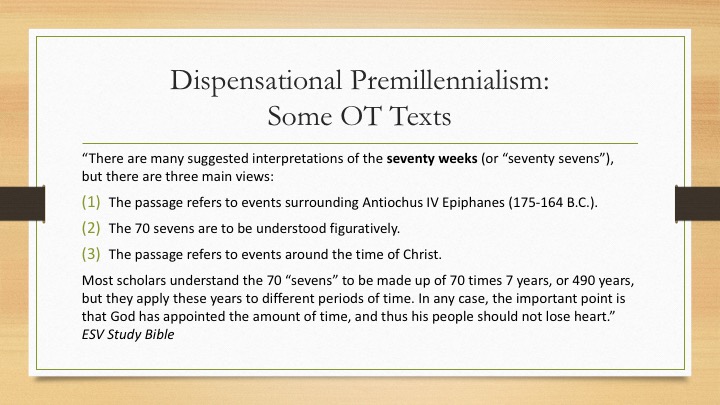
Dispensational
Premillennialism:
Some OT Texts
“There are many suggested interpretations of the seventy weeks (or “seventy sevens”), but there are three main views:
(1)The passage refers to events surrounding Antiochus IV Epiphanes (175-164 B.C.).
(2)The 70 sevens are to be understood figuratively.
(3)The passage refers to events around the time of Christ.
Most scholars understand the 70 “sevens” to be made up of 70 times 7 years, or 490 years, but they apply these years to different periods of time. In any case, the important point is that God has appointed the amount of time, and thus his people should not lose heart.” ESV Study Bible
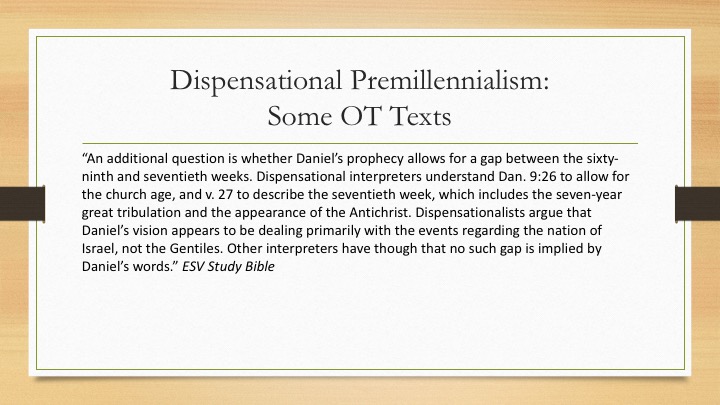
Dispensational
Premillennialism: - Some OT Texts
“An additional question is whether Daniel’s prophecy allows for a gap between the sixty-ninth and seventieth weeks. Dispensational interpreters understand Dan. 9:26 to allow for the church age, and v. 27 to describe the seventieth week, which includes the seven-year great tribulation and the appearance of the Antichrist. Dispensationalists argue that Daniel’s vision appears to be dealing primarily with the events regarding the nation of Israel, not the Gentiles. Other interpreters have though that no such gap is implied by Daniel’s words.” ESV Study Bible
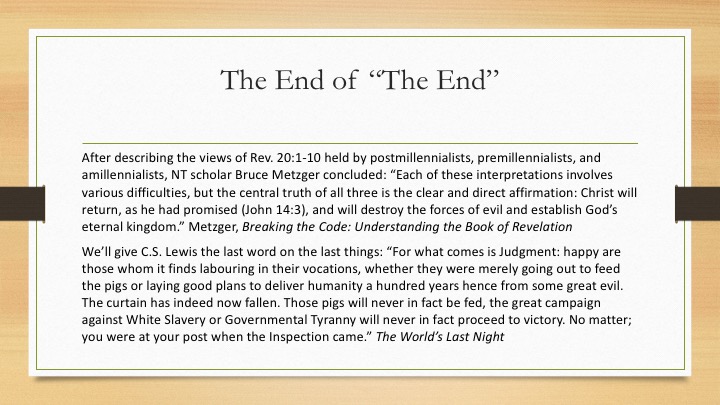
The End of “The End”
After describing the views of Rev. 20:1-10 held by postmillennialists, premillennialists, and amillennialists, NT scholar Bruce Metzger concluded: “Each of these interpretations involves various difficulties, but the central truth of all three is the clear and direct affirmation: Christ will return, as he had promised (John 14:3), and will destroy the forces of evil and establish God’s eternal kingdom.” Metzger, Breaking the Code: Understanding the Book of Revelation
We’ll give C.S. Lewis the last word on the last things: “For what comes is Judgment: happy are those whom it finds labouring in their vocations, whether they were merely going out to feed the pigs or laying good plans to deliver humanity a hundred years hence from some great evil. The curtain has indeed now fallen. Those pigs will never in fact be fed, the great campaign against White Slavery or Governmental Tyranny will never in fact proceed to victory. No matter; you were at your post when the Inspection came.” The World’s Last Night